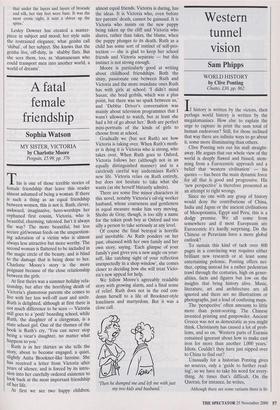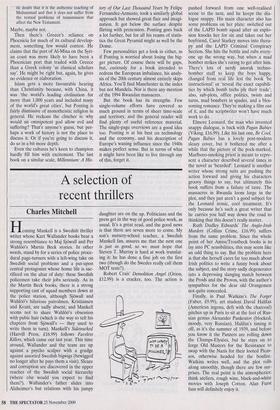Western tunnel vision
Sam Phipps
WORLD HISTORY by Clive Ponting Chatto, £30, pp. 862 If history is written by the victors, then perhaps world history is written by the megalomaniacs. How else to explain the urge to capture in print the sum total of human endeavour? Still, for those inclined that way there are infinite ways to go about it, some more illuminating than others.
Clive Ponting sets out his stall straight- away. He argues that our whole view of the world is deeply flawed and biased, stem- ming from a Eurocentric approach and a belief that 'western civilisation' — his quotes — has been the main dynamic force for all that is good and progressive. His `new perspective' is therefore presented as an attempt to right wrongs.
Since no one with any grasp of history would deny the contributions of China, India and Japan or the ancient civilisations of Mesopotamia, Egypt and Peru, this is a dodgy premise. We all come from somewhere and if most Europeans are Eurocentric it's hardly surprising. Do the Chinese or Peruvians have a more global outlook?
To sustain this kind of tack over 800 pages in a convincing way requires either brilliant new research or at least some entertaining polemic. Ponting offers nei- ther, opting instead for a rather pedestrian trawl through the centuries, high on gener- alities, facts and figures but low on the insights that bring history alive. Music, literature, art and architecture are all ignored and there are no illustrations or photographs, just a load of confusing maps.
The 'perspective' often amounts to little more than point-scoring. The Chinese invented printing and gunpowder. Ancient Greece was not as democratic as you might think. Christianity has caused a lot of prob- lems, and so on. 'Western parts of Eurasia remained ignorant about how to make cast iron for more than another 1,000 years.' Idiots. Couldn't they have just nipped over to China to find out?
Unusually for a historian Ponting gives no sources, only a 'guide to further read- ing', so we have to take his word for every- thing. At times that's difficult. On the Quoran, for instance, he writes,
Although there are some variants there is lit- tie doubt that it is the authentic teaching of Muhammad and that it does not suffer from the textual problems of transmission that affect the New Testament.
Maybe, maybe not.
Then there's Greece's reliance on Phoenicia for much of its cultural develop- ment, something few would contest. He claims that the port of Al-Mina on the Syri- an coast was more likely to have been a Phoenician port that traded with Greece than a Greek colony 'as classical scholars say'. He might be right but, again, he gives no evidence or elaboration.
Islam gets a more favourable hearing than Christianity because, with China, it was 'the world's leading civilisation for more than 1,000 years and included many of the world's great cities', but Ponting is fairly dismissive of monotheistic religion in general. He reckons the clincher is: why would an omnipotent god allow evil and suffering? That's anyone's guess, but per- haps a work of history is not the place to discuss it. Or if you're going to discuss it, do so in a bit more depth.
Even the cultures he's keen to champion hardly fill him with excitement. The last book on a similar scale, Millennium: A His- tory of Our Last Thousand Years by Felipe Fernandez-Armesto, took a similarly global approach but showed great flair and imagi- nation. It got below the surface despite flirting with pretension. Ponting goes back a lot further, but for all his reams of statis- tics the Great Pyramid might as well be the Dome.
Few personalities get a look in either, as if Ponting is worried about losing the big- ger picture. Of course there will be gaps, but, curiously for a book intended to redress the European imbalance, his analy- sis of the 20th century almost entirely skips Africa. You'll find Manchester in the index but not Mandela. Nor is there any mention of the 1994 Rwandan massacres.
But the book has its strengths. Few single-volume efforts have covered so much ground in terms of sheer time-scale and territory, and the general reader will fmd plenty of useful reference material. The single-page overviews are a good idea too. Ponting is at his best on technology and the economy, and his description of Europe's waning influence since the 1940s makes perfect sense. But in terms of what it might have been like to live through any of this, forget it.






























































































 Previous page
Previous page